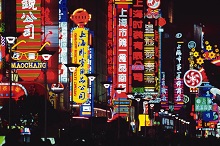More Than Just Dialects - Differences Between Mandarin and Cantonese
July 3, 2017

Hello, I am Yosshi. I entered the translating business two years ago, dreaming of an international career. Since then, every day I keep discovering more about the ever-fascinating world of translation.
Previously on this blog, I wrote about the differences between the two types of scripts in Chinese - simplified and traditional Chinese. Then the other day, while I was on my way back to the office after seeing a client, my supervisor asked me if I knew the differences between Mandarin and Cantonese in the Chinese language... So I decided to look it up.
Mandarin and Cantonese - Completely Different Languages
According to Ecom Chūgokugo Net, different languages are spoken in different regions of China. The first thing that popped into my mind was the difference between American and British English; even in Japan, different dialects such as Kansai dialect and Aomori dialect exist, so it's no surprise that there are many in China. However, after much research, I found out that Mandarin and Cantonese are so different to the point where it's hard to communicate between speakers of the two variations!
Mandarin is considered to be the official and standard language of China. On the other hand, the language most commonly spoken in the Guangdong Province (southern part of China), Hong Kong, and Macau, is Cantonese. In comparison to Mandarin, it may sound more like a minor dialect - however, there are over 100 million Cantonese speakers worldwide, including in Chinatowns all over the world and overseas Chinese communities. Impressive!
Mandarin - Easier to Learn and Pronounce
Chinese pronunciation is very difficult. I heard once that even for the "ma" sound, meanings differ depending on the intonation. In Japanese, we distinguish certain words using intonation as well - such as "A-me" (rain) and "a-ME" (candy), and "haSHI" (bridge) and "HAshi" (chopsticks). In Mandarin, there are 4 intonations, and even for the same "ma" sound, it can mean completely different things such as "mom," "hemp," "horse," and "to scold." Having to remember all 4 different intonations and their meanings sounds difficult, but in Cantonese, there are 6 intonations for each sound!
In Mandarin, there is an established pronunciation guide system called pinyin, which uses the Latin alphabet. It is similar to the Romanization system in Japanese, and you will be able to pronounce anything n Chinese once you master pinyin. According to the website "Donto Koi Chūgokugo," the term "Japan" in Mandarin is denoted as "rì běn" in pinyin, and it sounded like "ree-ben". Meanwhile, in Cantonese, there is no established pronunciation guide system, and the pronunciation guide differs depending on the dictionary and the textbook. Moreover, since Cantonese is only used for speaking, there are situations where there are no matching characters to denote the sounds. If it must be written, a radical is added to a similar sounding character to represent the sound. Looks like Mandarin is the easier language to learn!
Cantonese for Hong Kong Movie Lovers
Cantonese seem like a difficult language to learn, but after research, I found that Cantonese is actually more familiar to Japanese speakers than it might seem - Hong Kong movies! I also went through a phase where I was obsessed with Hong Kong movies, but talking about Hong Kong movies brings us to... Jackie Chan! To me, it was all about the action and I didn't think much about the language, but the spoken language is Cantonese. According to "Hong Kong Navi," it has been said that the Japanese affirmative response "hai" came from the Cantonese affirmative response which has the same sound. Adding "ah" at the end and saying "hai ah" makes it more colloquial, and now that I think about it, Jackie Chan may have said "hai ah!" in the movies... Thinking about that made me want to go back and watch the movies again!
There seem to be a lot of words derived from Cantonese in Japanese, too. If I were to list some Japanese examples from "List of Food Names Derived From Chinese," food names such as "wantan" (wonton), "shuumai" (shaomai/siew mai), "raichi" (lychee) were apparently derived from Japanese.
Choose Which Language to Use, Depending on the Region and the Purpose!
So now we know that even though they're both Chinese, Mandarin and Cantonese are so different that it's not like an American person communicating with a British person. Both Hong Kong and Macau are popular holiday destinations for Japanese people, and I've wanted to visit, but I almost went to Hong Kong with Mandarin in mind... It's always important to choose the correct language based on the destination and the purpose, not just for Chinese!
Related Services
| << Tulip: The Flower that Caused the 1630s Market Bubble - Why the Netherlands' Floral Emblem is So Popular | A Newly Emerging Economic Power - Indonesia and its Language >> |
To Contact Us Regarding Our Translation Services
For urgent needs, call:
+81-3-5730-6133
